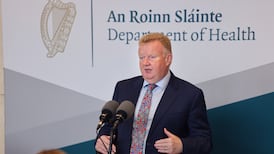Better screening, diagnosis and treatments mean that for many patients today, cancer can become a chronic ongoing illness that requires long-term management.
In recent years, research has started to look at the importance of a healthy lifestyle after cancer treatment. Many websites, books, blogs, articles and experts exist, giving advice on how to eat during cancer treatment, and afterwards.
However, Dr Aoife Ryan, a registered dietitian and lecturer in nutritional sciences at UCC, points out that many of these diets do not have a solid evidence base and are experimental, meaning there is a lot of misleading nutritional advice for cancer survivors out there.

Dr Ryan is co-author with Dr Éadaoin Ní Bhuachalla of a new free evidence-based cookbook for cancer survivors called Healthy Eating for Cancer Survivors, which has been launched by University College Cork in conjunction with Breakthrough Cancer Research, in response to the many "fad" diets currently being pushed on cancer patients (20,000 free copies of the book are available through the dietetic departments of Irish hospitals, or by contacting breakthroughcancerresearch.ie).
The new book, which is available in hospitals across Ireland, is a sequel to their award-winning cancer cookbooks which have been helping those fighting the disease to maintain their weight. The new book is targeted towards those who have finished cancer treatment and have been told by their doctors to follow a healthy eating diet.
Healthy Eating for Cancer Survivors contains the latest information from the World Cancer Research Fund report from 2018 and is endorsed by the Irish Society of Medical Oncology, the Irish Nutrition and Dietetic Institute, Irish Society for Clinical Nutrition and Metabolism and the National Cancer Control Programme.
The recommendations for healthy lifestyle choices are explained in lay language, which includes a collection of healthy recipes for meals and snacks suitable for all the family.
“For those who are lucky enough to be cured of cancer, there was a gap in reliable evidence-based information which was being filled by non-experts including chefs, bloggers and cancer survivors advocating diets like the ketogenic diet, blood type diets and juice diets, or to avoid dairy or go vegan,” says Dr Ryan. “Our aim with this book was to cut through all the confusing noise out there and provide the best advice on healthy eating for cancer survivors who want to improve their chances of long-term survival and in some cases, lose weight.”
Dr Ryan points out that the recipes are not extravagant and are low in fat, salt and sugar and high in fibre, vegetables and wholegrains. They are suitable for the general population including children, not just cancer survivors, and for people with diabetes and heart disease. “For cancer survivors who do not have problems with weight-loss or with their appetite or food intake, a healthy eating diet might be the most appropriate plan. If you have completed your cancer treatment and been told that you are in remission, it is best to eat a healthy diet, keep physically active and try to maintain a healthy body weight.”
It is recommended that all patients diagnosed with cancer receive advice from a registered healthcare professional (preferably from a registered dietitian with experience in oncology, or to talk to their oncologist or cancer specialist nurse) on what diet best suits their diagnosis and personal needs.
The book notes: “There is scientific evidence that certain lifestyle factors can help to reduce the risk of developing a new cancer and the risk of a cancer coming back. Unfortunately, no change can reduce your risk totally or guarantee a cancer-free life. There are people who do everything ‘right’ and still develop cancer. There are people who make all of the recommended changes after a cancer diagnosis and unfortunately their disease may still return despite this. However, there are things you can do to help you be as healthy as possible.”
HEALTHY SNACKS
Choosing snacks that are healthy and low in calories can be challenging. Some options include:
– Piece of fruit
– Handful of berries
– Fruit salad
– Fruit skewer/fruit skewer with low fat cheese
– Chopped raw vegetables with hummus/healthy dip
– ½ avocado
– Low-fat yoghurt
– Stewed fruit with yoghurt
– Glass of low-fat milk
– Cup of homemade soup
– Frozen low-fat yoghurt
– Roasted chickpeas with spices
– Small handful of nuts, eg peanuts, almonds, hazelnuts, cashews, walnuts
– Small handful of dried fruit
– Small bowl of wholegrain cereal
– Small brown scone with no added sugar jam/nut butter
– Overnight oats
– 1 mini-brown bagel with low-fat homemade hummus/salsa/healthy dip
– Rice cakes/wholemeal crisp bread topped with tsp nut butter or mashed banana or matchbox size low-fat cheese or low-fat cheese spread.

Mediterranean Fish Tray Bake
Serves: 4
Prep time: 15 minutes
Cooking time: 30-35 minutes
Ingredients:
– 800g baby potatoes
– 250g cherry tomatoes
– 1 courgette, chopped
– 2 red peppers, chopped
– 1 red onion, peeled and cut into wedges
– Handful of black olives (stone removed), rinsed
– 4 cloves of garlic, peeled and quartered
– Sprigs of fresh thyme or rosemary
– 1-2 tbsp olive oil
– 4 x 120g fish fillets of your choice, eg salmon, cod, hake etc.
Dressing:
– Small handful fresh basil leaves
– Juice ½ lemon
– ½ a small clove of garlic
– ½ teaspoon Dijon mustard
– 4 heaped tbsps low-fat Greek style yoghurt
– 1 tbsp extra virgin olive oil
Method:
– Pre-heat the oven to 200°C/gas mark 6.
– Scrub the potatoes clean and halve any large ones.
– Arrange the potatoes and all of the vegetables on a baking tray lined with greaseproof paper and scatter over the olives, herbs, garlic and olive oil.
– Place in the oven and cook for 15- 20 minutes.
– Remove tray from the oven and place fish fillets on top of the vegetables, along with the rounds of lemon. Return the tray to the oven and continue to cook for a further 15-20 minutes or until the potatoes, vegetables and fish are cooked through.
– While the tray bake is cooking, make the basil and mustard yoghurt dressing. Crush the basil and scrape into a bowl. Add half clove crushed garlic, mustard, yoghurt and the juice of half a lemon. Add one tablespoon of olive oil, mix well and serve drizzled over the salmon tray bake when cooked.
NUTRITION INFORMATION
– Typical Values Amount per serving
– Energy (kcals) 405
– Fat (g) 14
(of which saturates) (g) 2
– Carbohydrate (g) 39
(of which sugars) (g) 12
– Protein (g) 31
– Fibre (g) 8










